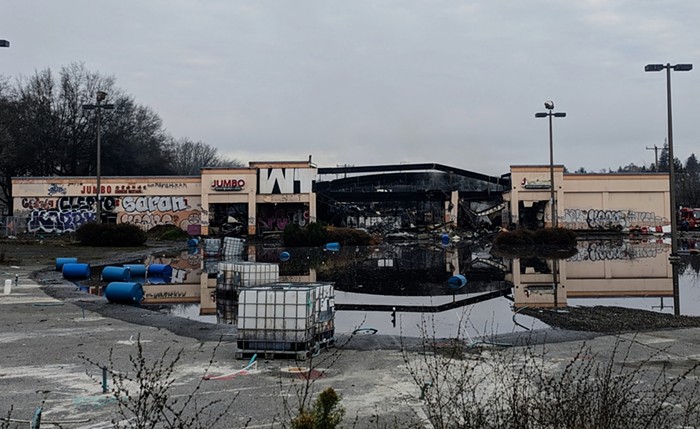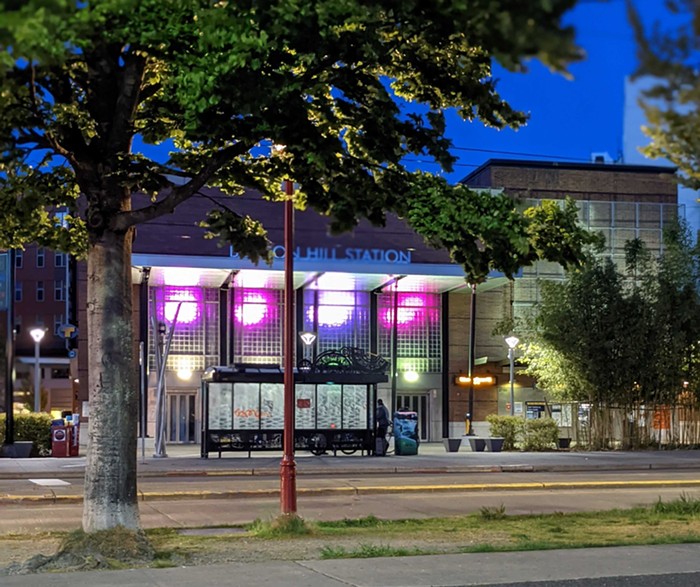
It was glaringly obvious before, but the coronavirus crisis has made Washington’s dire affordability crisis all the more apparent.
Mass layoffs mean many of Washington’s one million renters won’t be able to make rent next week. To give you some idea of how many won’t be able to pay, know that 53,000 tenants in the Seattle-area alone spend half of their paycheck on rent, and another 57,000 spend at least 30% of their check for rent. Between 50 and 74% of Americans live paycheck-to-paycheck. If any of those people were laid off last week—and there's a pretty good chance they were—they most likely won’t be able to pay rent on Wednesday.
In response to the virus crisis, the Governor has issued a temporary moratorium on evictions, and the state Supreme Court has postponed eviction proceedings until April. So if renters can’t pay, the Sheriff won’t drag them out of their homes next month. But landlords can still charge late payment fees (outside of Seattle, Kenmore, Burien, Woodinville, Auburn, Everett, Issaquah, and Spokane), and unless the state enacts a rent freeze, unemployed tenants will continue to accrue thousands of dollars in rent they can't pay.
Calls for a rent strike have grown across the country, and they seem particularly loud in places such as Seattle, where rents have raised 69% over the last decade. But are people being serious about this? And is a rent strike a good idea?
Are People Really Striking?
Dinah Braccio, a tenant education coordinator at the Tenants Union of Washington State, says they're "hearing some rumblings" of a rent strike.
“Rent strike? I’m not only hearing it, they're spray painting it all over my company's building," said Washington State Representative Andy Barkis, a small landlord in Olympia who also owns Hometown Property Management, which has a portfolio of 1,100 single-family rental homes. "I think it’s bullshit. It’s a fringe, and I don’t put much credence in it," he added. "What does a rent strike do? Does it solve the problem? It just creates more problems. That’s the thing I don’t understand."

The group behind rentstrike.noblogs.org has been pasting pretty posters all over town calling for a strike in Seattle. On their blog, they list some barebones instructions for organizing strikes in individual buildings, provide a few letter templates to help toward that end, and link to a legal resource for people struggling to pay due to COVID-19 closures.
They're also collecting anonymous declarations from striking renters. Of the six submissions posted so far, five appear to be individuals refusing to pay, and one is someone saying they're actively working to organize their building.
In an email, the group, who claims they're "not an organizing body" but rather a small collective "simply trying to help compile responses to the economic crisis surrounding the COVID-19 epidemic," predicts "the amount of people going on rent strike will far exceed what is collected on this blog."
"The strike itself can't be quantified by the number of declarations, as each one is also a beacon for others to follow suit," they added.
One renter who lives near 15th Ave. on Capitol Hill started posting up rent strike flyers in their own 74-unit apartment building on Thursday. The flyers instruct residents to join a Facebook group and sign a letter of intent to send a message to the landlord and to lawmakers "that we're on STRIKE until this crisis is over."
This person, who wishes to remain anonymous for fear of retaliation, started organizing to stand in solidarity with those who can't pay next week, and who can't afford to keep accruing rent and late fees in the coming months.
"Almost every person I know has been laid off from work and has no income," the tenant said. "I think it’s irresponsible for Gov. Inslee to force businesses to close, put people out of work, and not freeze rent. It’s unjust, and I think it’ll create bigger problems if we don’t have action from local, state, federal governments. And if they’re not going to do it, then we’ll have to do it for ourselves."
None of the other tenants in the building have joined the Facebook group in the 12 hours since the flyers were posted. The tenant speculates many in the building haven't left their apartments yet this morning, and that the "fairly new building" may be full of employed people who "don’t see it as a problem for them." If no one bites in a couple days, the tenant will reconsider their efforts. "Collective action works, but it only works when it's actually collective. I hope people see this as important not just for the whole building, but for the whole city," the tenant said.
Is Holding a Rent Strike a Good Idea?
Xochitl Maykovich, political director of Washington CAN, said she "doesn't know anybody who has actually organized a building who thinks a rent strike is a good idea in response to COVID."
"Rent strikes are something you do as part of a campaign against a landlord, and they require deep organizing and a clear demand," she added. "This is also a tactic that is escalatory in nature—this is like the last step in getting something from a landlord, not the first."
Maykovich added that tenants who can't pay rent due to emergencies have a few legal options available to them in Washington state, while those who willingly withhold rent have none. "They will be evicted, they will owe attorney's fees and court costs, and they will have a 12% interest on the judgment. Along with the eviction on their record," she said. Though they can save their tenancies if they pay off what's owed at any point in the eviction process, including for five days after the judgement process.
In an email, Braccio, the tenant educator at the Tenants Union, said "it’s important to remember that a rent strike is a tactic, not a demand."
Organizers can use the tactic to demand that landlords waive rents for tenants who can't pay, or to support larger political efforts to demand a rent freeze and rent forgiveness for those who've lost their jobs, but Braccio also stressed the need to earn buy-in from neighbors.
"It’s important to be realistic about the severe and long-lasting consequences withholding rent can have on individuals if the strike is unsuccessful, both in terms of rent and late fees accruing and legal actions when moratoriums are lifted and courts re-open," Braccio said. "Anyone contemplating a rent strike should be in constant communication with their neighbors/fellow strikers (and with the broader neighborhood community) and making plans to support folks throughout the process, especially the most vulnerable strikers."
If people can't pay rent because they got laid off, Braccio recommends first informing their landlord of the current statewide eviction moratorium. Those who live in Seattle, Kenmore, Burien, Woodinville, Auburn, Everett, Issaquah, or Spokane should also mention local orders banning late fees. "Beyond that they could talk with their neighbors, from a safe distance, and see if this is an opportunity to negotiate with their landlord as a group."
"I would also encourage people to be contacting their state and city representatives because they need to be doing more to protect renters in these tumultuous times," Braccio added.
The Rental Housing Association of Washington (RHA), one of the landlord lobbies, is recommending that their members offer payment plans for unemployed tenants.
Individual landlords are responding in a variety of ways:
Whole range of responses on this public forum showing how landlords are grappling with rent relief in a time of massive layoffs. pic.twitter.com/meGurR82Px
— Katherine Khashimova Long (@_katya_long) March 27, 2020
Though landlords have much more leeway with mortgage payments than tenants have with rent payments, Rep. Barkis warns that unpaid rent may lead to mortgages going unpaid, which could "trash" credit scores for landlords. He adds that property management companies like his own will start laying off staff, too. He said he's paying his staff of 18 through the month, but "if it goes bad I may have to cut my staff in half" and he may also "scale down" paying "electricians, plumbers, and maintenance" workers to do repairs. So uh, just a heads up to Barkis's tenants.
Okay So What the Fuck Are Elected Leaders Doing?
On the conservative side, Barkis and the RHA are calling for the Governor to provide rental assistance to tenants "immediately." Barkis believes $25 million from the legislature's $200 million COVID-19 relief package could be used to fund such a measure, and that the Landlord Mitigation Fund or some other vehicle could be altered to administer those payments.
Washington Commerce Director Lisa Brown said her department is "hoping we can come up with options for rental assistance," but they're waiting to see what changes Gov. Inslee makes to the state budget before he signs it, and for the President to sign the $2 trillion relief package that passed Congress on Friday.
"We believe there may be housing and homelessness assistance in that, and as soon as the budget is signed we’ll look at our options within whole Commerce housing and homelessness framework. It's too early to say for sure, but it’s definitely on our radar," Brown said.
Braccio argues that any rental assistance needs to be paired with some concessions from property owners in the form of strong tenant protections.
"Rental assistance is ultimately public/taxpayer money that will line landlords’ pockets. If landlords are going to get a bailout, then they need to agree to partial rent forgiveness for folks who have lost work and are unable to pay. Tenants will not be made whole by rental assistance alone and so neither should landlords," she said.
Given that Trump's $1,200 check won't even cover a month's rent for most tenants in Washington, the Tenants Union is calling for any landlord bailout to come with "statewide Just Cause protections, so landlords don’t just turn around and evict people for no reason and with no due process once the moratoriums are lifted." The union is also calling for a rent freeze, "or even rent rollbacks in the highest-cost areas where safe housing is criminally out of reach for poor and working people and families."
Seattle Rep. Nicole Macri said she asked Inslee to consider a statewide ban on late fees, and also to consider a rent freeze. Sen. Patty Kuderer sent a formal letter of request to the governor yesterday also asking for a suspension of late fees on residential rental agreements. Macri pushed him to enact the statewide temporary ban on evictions, so maybe he'll listen to her again.
Meanwhile, on Friday Seattle City Council Member Tammy Morales introduced a resolution calling for state and federal lawmakers to freeze rents and mortgage payments.


















